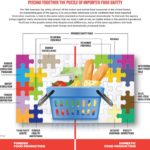The FDA's Commissioner Dr. Scott Gottlieb and Deputy Commissioner Frank Yiannas are announcing a new strategy to modernizing government oversight of imported food. This country imports about 15% of its food supply from more than 200 countries or territories around the world. Other countries supply 32% of our fresh vegetables, 55% of fresh fruit, and 94% of our seafood. And there have been quite a few food poisoning outbreaks linked to imported food in the past few years. Last year, a Salmonella Concord outbreak was linked to tahini imported from Israel. In 2017, a Salmonella outbreak linked to papayas imported from Mexico sickened at least 255 people with nine different strains of the pathogen. And in 2016, almost a thousand people were sickened across the country with Salmonella … [Read more...]
Almanza’s Restaurant in Garden City, CO Closed By Officials
Almanza's restaurant at 2502 8th Avenue in Garden City, Colorado has been closed bye the Board of Weld County Commissioners. The restaurant will remain closed until it fixes "repeated health code violations." The Weld County Department of Public Health requested the closure. Chairwoman of the Board, Barbara Kirkmeyer, told the Greeley Tribune that the restaurant needs to hire a food safety consultant, train all staff in food safety, and require the manager and owner to get food protection manager certification. The restaurant has had issues with inspections in the past. The most recent inspection garnered nine critical and two non-critical health code violations. The restaurant was closed twice in 2017 because the sinks in the women's restrooms and the kitchen were not working … [Read more...]
USDA Will Begin Posting Location-Specific Food Safety Data
The USdA is going to begin sharing food safety data specific to slaughter and processing facilities on Data.gov. The FSIS Establishment-Specific Data Release Strategic Plan will let consumers make more informed choices. It may also motivate these establishments to improve their performance, and uncover the strengths and weaknesses of different food safety and processing practices. USDA Deputy Under Secretary for Food Safety Al Almanza said, "FSIS' food safety inspectors collect vast amounts of data at food processing facilities every day, which we analyze on an ongoing basis to detect emerging public health risks and create better policies to prevent foodborne illness. Consumers want more information about the foods they are purchasing, and sharing these details can give them better … [Read more...]
FDA Warning Letter Sent to Lavella Brothers Warehouse
On June 23, 2016, the FDA sent a warning letter to Lavella Brothers food warehouse in Chester, Pennsylvania after an inspection on May 4 through May 26, 2016 found "significant violations of the FDA's Current Good Manufacturing Practice (cGMP) regulations. The violations "cause the food products stored at your facility to be adulterated, in that they were prepared, packed, or held under insanitary conditions whereby they may have been contamianted with filth or rendered injurious to health." The facility is also not registered with FDA. The violations included: not using water that is safe and of adequate sanitary quality in food and food-contact surfaces. The firm did not have running water in the restrooms, and the toilets and hand washing sinks were not functioning. There had … [Read more...]
Top Chicken Brands Inspected by Employees
Food & Water Watch released a list of poultry plants, along with their supermarket brands, that are participating in the USDA's New Poultry Inspection System (NPIS) that removes government inspectors from slaughter lines and gives that responsibility to company employees. This comes right after reports that some employees are denied bathroom breaks, so have taken to wearing diapers to work. Wenonah Hauter, Executive Director of Food & Water Watch said in a statement, "As consumers get ready for the summer grilling season, they need to know which poultry plants are using privatized inspection to prioritize efficiency and profits over people. The USDA should never have allowed companies to police themselves, but to add insult to injury, they failed to even let consumers know … [Read more...]
Blue Bell May Have Figured Out Listeria Contamination Source
According to two letters sent to the FDA in mid-February, 2016, Blue Bell thinks they have identified where the Listeria monocytogenes bacteria were living in two of its plants last year. But the problem areas were redacted in the letters that the FDA published recently, to "protect trade secrets." The company found the pathogenic bacteria in equipment at its Brenham, Texas plant and thinks it spread in the drainage system of the plant in Broken Arrow, Oklahoma. The deadly Listeria monocytogenes outbreak linked to Blue Bell products prompted a massive recall of all of Blue Bell's products. All three plants were shut down for months last summer. The company started producing and selling ice cream again in August 2016 after an investor stepped up to help them out. Ten people in four … [Read more...]
Imported Foods Most Often Rejected: Seafood, Veggies, and Fruit
The USDA has released a report detailing the foods the Food and Drug Administration (FDA) most often rejects at our nation's ports for problems. They are seafood/fish products, vegetables/vegetable products, and fruit/fruit products. The countries that have the most shipments refused are Mexico, India, and China. Data for this report was analyzed over the years 2005 to 2013 and was compared to data from the years 1998 to 2004. In addition, refusals of spices, flavors, and salts doubled between 1998 to 2004 and 2005 to 2013. The FDA only inspects about 1% of the 60,000,000 tons of food imported into this country every year. Inspectors target certain facilities and firms and certain types of products that have a higher risk for pathogenic bacterial contamination or other type of … [Read more...]
Recalled Imported Pork Highlights Problems with TPP
Food & Water Watch has sent a letter to USDA Secretary Tom Vilsack, stating that the recent recall of 170,000 pounds of imported pork and nine other recent recalls highlights the fact that the Trans Atlantic Trade Partnership (TPP) and the Transatlantic Trade and Investment Partnership agreements may be flawed and problematic for food safety concerns. Both of those agreements would expedite food imports into the United States from other countries. That recall this month was for pork from Denmark. The meat was not presented at the U.S. point of entry for inspection as the law requires. Food & Water Watch wrote to USDA about this problem last year, but states "the problem seems to be getting worse." USDA claims that the Public Health Information System (PHIS) and Customs and … [Read more...]












